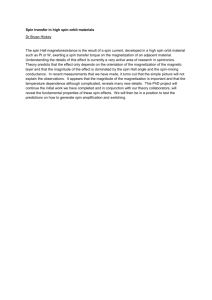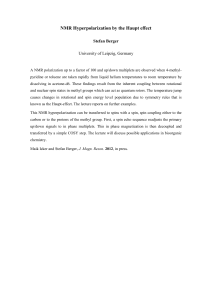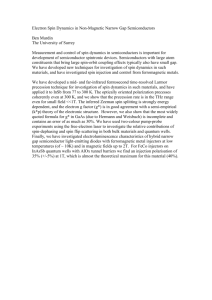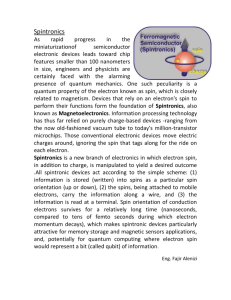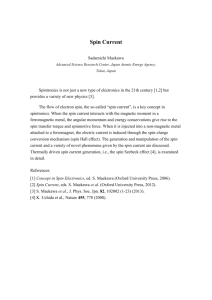View
advertisement
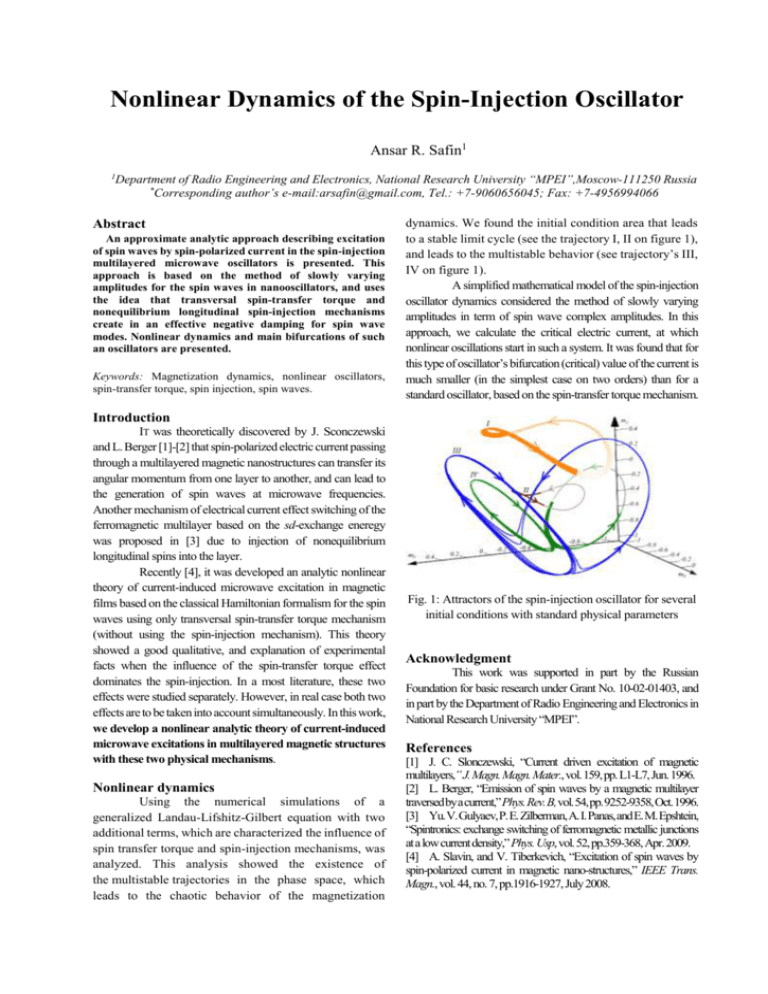
Nonlinear Dynamics of the Spin-Injection Oscillator Ansar R. Safin1 Department of Radio Engineering and Electronics, National Research University “MPEI”,Moscow-111250 Russia * Corresponding author’s e-mail:arsafin@gmail.com, Tel.: +7-9060656045; Fax: +7-4956994066 1 Abstract An approximate analytic approach describing excitation of spin waves by spin-polarized current in the spin-injection multilayered microwave oscillators is presented. This approach is based on the method of slowly varying amplitudes for the spin waves in nanooscillators, and uses the idea that transversal spin-transfer torque and nonequilibrium longitudinal spin-injection mechanisms create in an effective negative damping for spin wave modes. Nonlinear dynamics and main bifurcations of such an oscillators are presented. Keywords: Magnetization dynamics, nonlinear oscillators, spin-transfer torque, spin injection, spin waves. dynamics. We found the initial condition area that leads to a stable limit cycle (see the trajectory I, II on figure 1), and leads to the multistable behavior (see trajectory’s III, IV on figure 1). A simplified mathematical model of the spin-injection oscillator dynamics considered the method of slowly varying amplitudes in term of spin wave complex amplitudes. In this approach, we calculate the critical electric current, at which nonlinear oscillations start in such a system. It was found that for this type of oscillator’s bifurcation (critical) value of the current is much smaller (in the simplest case on two orders) than for a standard oscillator, based on the spin-transfer torque mechanism. Introduction IT was theoretically discovered by J. Sconczewski and L. Berger [1]-[2] that spin-polarized electric current passing through a multilayered magnetic nanostructures can transfer its angular momentum from one layer to another, and can lead to the generation of spin waves at microwave frequencies. Another mechanism of electrical current effect switching of the ferromagnetic multilayer based on the sd-exchange eneregy was proposed in [3] due to injection of nonequilibrium longitudinal spins into the layer. Recently [4], it was developed an analytic nonlinear theory of current-induced microwave excitation in magnetic films based on the classical Hamiltonian formalism for the spin waves using only transversal spin-transfer torque mechanism (without using the spin-injection mechanism). This theory showed a good qualitative, and explanation of experimental facts when the influence of the spin-transfer torque effect dominates the spin-injection. In a most literature, these two effects were studied separately. However, in real case both two effects are to be taken into account simultaneously. In this work, we develop a nonlinear analytic theory of current-induced microwave excitations in multilayered magnetic structures with these two physical mechanisms. Nonlinear dynamics Using the numerical simulations of a generalized Landau-Lifshitz-Gilbert equation with two additional terms, which are characterized the influence of spin transfer torque and spin-injection mechanisms, was analyzed. This analysis showed the existence of the multistable trajectories in the phase space, which leads to the chaotic behavior of the magnetization Fig. 1: Attractors of the spin-injection oscillator for several initial conditions with standard physical parameters Acknowledgment This work was supported in part by the Russian Foundation for basic research under Grant No. 10-02-01403, and in part by the Department of Radio Engineering and Electronics in National Research University “MPEI”. References [1] J. C. Slonczewski, “Current driven excitation of magnetic multilayers,” J. Magn. Magn. Mater., vol. 159, pp. L1-L7, Jun. 1996. [2] L. Berger, “Emission of spin waves by a magnetic multilayer traversed by a current,” Phys. Rev. B, vol. 54, pp. 9252-9358, Oct. 1996. [3] Yu. V. Gulyaev, P. E. Zilberman, A. I. Panas, and E. M. Epshtein, “Spintronics: exchange switching of ferromagnetic metallic junctions at a low current density,” Phys. Usp, vol. 52, pp.359-368, Apr. 2009. [4] A. Slavin, and V. Tiberkevich, “Excitation of spin waves by spin-polarized current in magnetic nano-structures,” IEEE Trans. Magn., vol. 44, no. 7, pp.1916-1927, July 2008.

